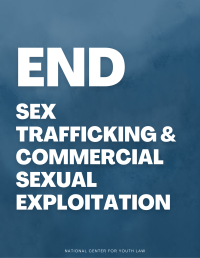Landmark First Responder Protocol Prioritizes Health, Safety Of Children Impacted By CSE
Los Angeles County revolutionized the way it responds to children experiencing commercial sexual exploitation (CSE) with the implementation of an innovative protocol authored by NCYL in collaboration with lived experience experts and other community partners.
Developed by NCYL in partnership with key stakeholders, including survivors, in Los Agngeles, the Los Angeles County Law Enforcement First Responder Protocol (FRP) was first launched in 2014, with the goal of ensuring that when youth are identified as experiencing or at risk of commercial sexual exploitation, law enforcement, county agencies, and community-based advocates provide quick, coordinated, service-based responses. It reflects an understanding that these children have experienced and been exposed to severe violence, threats, and trauma. The protocol focuses on both meeting the immediate, short-term needs of the youth, and supporting them to achieve long-term safety and stability through youth-centered, strengths-based, and trauma-informed services provided by a team of professionals connected to the youth.
How it works
The FRP requires an expedited, 90-minute response following identification and additional, intensive engagement over the following 72 hours. Within the first 90 minutes after identification, law enforcement must engage the youth using victim-centered, trauma-informed strategies, report the known or suspected exploitation as child abuse to the Child Protection Hotline, assess the youth for any urgent medical or other needs, and transport the youth to a staging area.
Once at the staging area, a community-based advocate, as well as specialized workers meet with the youth, ensure their basic needs are met), and hold a multidisciplinary team meeting (MDT) to establish a safety plan. Within 72 hours, the young person receives a full medical and mental health assessment, as well as any necessary urgent medical care.
Following the expedited response over the first-72 hour period, both the specialized Probation and/or DCFS units and the community-based advocate remain connected to the youth. The community-based advocate serves as a support for the youth, guiding them through interactions with the various county agencies, ensuring that their voice is informing decision making, and providing case management and crisis management assistance as needed.
Creating change
The protocol marked a welcome change for youth and law enforcement professionals. Members of both groups, as well as social service providers, have lauded the FRP for its health-centric nature that focuses on addressing a child’s needs rather than using punitive responses.
The trusting and consistent relationship established with a community-based advocate can be the key to learning healthy decision-making and self-care skills and setting the foundation for a stable future. These advocates lift up the power and strength of the young person and provide them space to lead and determine what they need and want to shape their life.
A six-year review of the FRP, published in 2020, presented data from the first six years of implementation. It found that the reforms were leading to some positive outcomes for youth, but that more supports are still needed.
With the implementation of the FRP, L.A. County developed the infrastructure and partnership with law enforcement to ensure a coordinated response to serve youth without having to arrest them. This made implementation of SB 1322 in 2017 – which rendered the crimes of prostitution and loitering inapplicable to minors – more seamless in L.A. County than other places throughout the state.






